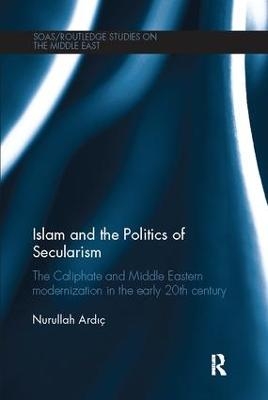
Islam and the Politics of Secularism
The Caliphate and Middle Eastern Modernization in the Early 20th Century
Seiten
2017
Routledge (Verlag)
978-1-138-11119-6 (ISBN)
Routledge (Verlag)
978-1-138-11119-6 (ISBN)
This book examines the process of secularisation in the Middle East in the late 19th century and early 20th century that transformed the Ottoman Empire and led to the abolition of the Caliphate.
This book examines the process of secularization in the Middle East in the late 19th and early 20th century through an analysis of the transformation and abolition of Islamic Caliphate. Focusing on debates in both the center of the Caliphate and its periphery, the author argues that the relationship between Islam and secularism was one of accommodation, rather than simply conflict and confrontation, because Islam was the single most important source of legitimation in the modernization of the Middle East.
Through detailed analysis of both official documents and the writings of the intellectuals who contributed to reforms in the Empire, the author first examines the general secularization process in the Ottoman Empire from the late 18th century up to the end of the 1920s. He then presents an in-depth analysis of a crucial case of secularization: the demise of Islamic Caliphate. Drawing upon a wide range of secondary and primary sources on the Caliphate and the wider process of political modernization, he employs discourse analysis and comparative-historical methods to examine how the Caliphate was first transformed into a "spiritual" institution and then abolished in 1924 by Turkish secularists. Ardıç also demonstrates how the book’s argument is applicable to wider secularization and modernization processes in the Middle East.
Deriving insights from history, anthropology, Islamic law and political science, the book will engage a critical mass of scholars interested in Middle Eastern studies, political Islam, secularization and the near-global revival of religion as well as the historians of Islam and late-Ottoman Empire, and those working in the field of historical sociology and the sociology of religion as a case study.
This book examines the process of secularization in the Middle East in the late 19th and early 20th century through an analysis of the transformation and abolition of Islamic Caliphate. Focusing on debates in both the center of the Caliphate and its periphery, the author argues that the relationship between Islam and secularism was one of accommodation, rather than simply conflict and confrontation, because Islam was the single most important source of legitimation in the modernization of the Middle East.
Through detailed analysis of both official documents and the writings of the intellectuals who contributed to reforms in the Empire, the author first examines the general secularization process in the Ottoman Empire from the late 18th century up to the end of the 1920s. He then presents an in-depth analysis of a crucial case of secularization: the demise of Islamic Caliphate. Drawing upon a wide range of secondary and primary sources on the Caliphate and the wider process of political modernization, he employs discourse analysis and comparative-historical methods to examine how the Caliphate was first transformed into a "spiritual" institution and then abolished in 1924 by Turkish secularists. Ardıç also demonstrates how the book’s argument is applicable to wider secularization and modernization processes in the Middle East.
Deriving insights from history, anthropology, Islamic law and political science, the book will engage a critical mass of scholars interested in Middle Eastern studies, political Islam, secularization and the near-global revival of religion as well as the historians of Islam and late-Ottoman Empire, and those working in the field of historical sociology and the sociology of religion as a case study.
Nurullah Ardıç is an assistant professor of sociology at Istanbul Şehir University, Turkey. His research focuses on religion and politics in the Middle East, Ottoman-Turkish modernization, social theory, and globalization, using historical-comparative and discourse analysis methods.
1. Islam, Politics and Secularization 2. Modernization, Religion and the Ottomans 3. The Caliphate Question: Historical and Discursive Context 4. Secularization in the Caliphal Center (1908-1916) 5. Colonization in the Caliphal Periphery (1914-1920) 6. Abolition of the Caliphate: Secular Reform, Religious Justification (1919-1924) 7. Islam and Modernity: Confrontation or Accommodation?
| Erscheinungsdatum | 04.07.2017 |
|---|---|
| Reihe/Serie | SOAS/Routledge Studies on the Middle East |
| Zusatzinfo | 2 Tables, black and white; 12 Halftones, black and white; 12 Illustrations, black and white |
| Verlagsort | London |
| Sprache | englisch |
| Maße | 156 x 234 mm |
| Gewicht | 453 g |
| Themenwelt | Geschichte ► Allgemeine Geschichte ► Neuzeit (bis 1918) |
| Geisteswissenschaften ► Geschichte ► Regional- / Ländergeschichte | |
| Geisteswissenschaften ► Religion / Theologie ► Islam | |
| Sozialwissenschaften ► Soziologie ► Spezielle Soziologien | |
| ISBN-10 | 1-138-11119-8 / 1138111198 |
| ISBN-13 | 978-1-138-11119-6 / 9781138111196 |
| Zustand | Neuware |
| Haben Sie eine Frage zum Produkt? |
Mehr entdecken
aus dem Bereich
aus dem Bereich
Giordano Bruno - ein ketzerisches Leben
Buch | Hardcover (2024)
C.H.Beck (Verlag)
29,90 €
das dramatische 16. Jahrhundert
Buch | Hardcover (2024)
Rowohlt Berlin (Verlag)
34,00 €


